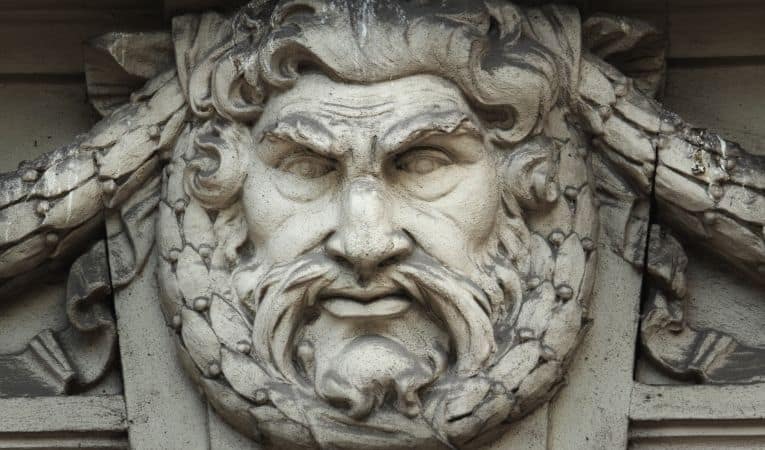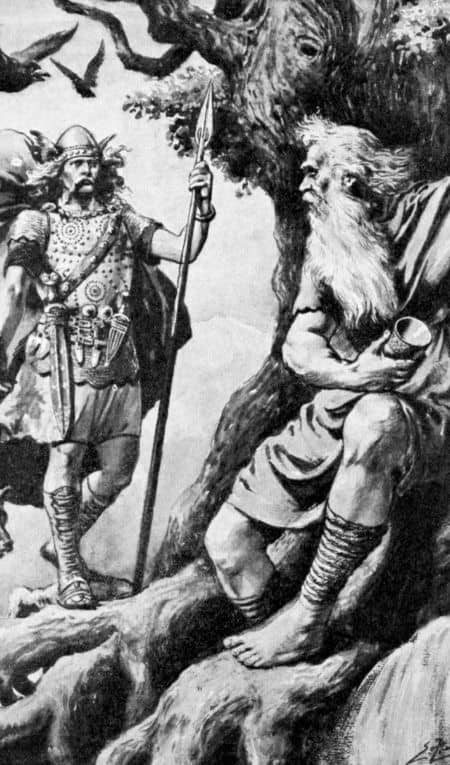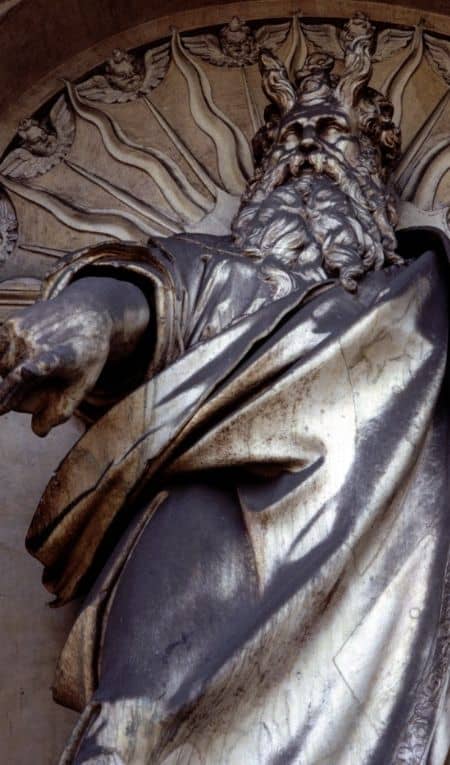One hurls lightning bolts from the heavens and rules from his temple perched high on Mount Olympus, while the other presides over fallen Viking warriors hand-selected to join him in Valhalla and (despite being one-eyed) is known as the all-seeing all-father.
The Norse god Odin and the Greek god Zeus are considered the top dog in their respective mythologies, but what about head-to-head?
In what would surely be an epic battle between the mightiest of gods, the slightest edge would go to Odin where he and Zeus pitted against each other.
Each is known as a god of war in his own respect, and both have vanquished fearsome foes, but Odin’s advantage comes not from his strength but his intellect.
When predicting the victor between human combatants, attributes like size, strength, and skill come into play.
When comparing gods with the stature of Odin and Zeus, additional factors must be considered, such as special powers, godly attributes, and magical weaponry.
So how could Odin come out on top between two genre-defining gods who seem evenly matched on the surface?
Wondering why Odin is often depicted with an eye patch? See This Is Why Odin Sacrificed His Eye to learn more.

How Could Odin Beat Zeus in a Fight? The Tale of the Tape
Norse mythology has its roots in stories passed down orally from one generation to another, starting around the 1st century AD.
Greek mythology dates back much further, with the earliest Greek myths dating back to the 8th century BC.
While both revolve around the exploits of a society of gods, Norse mythology has a harsher, more realistic view of life and world events. [1]
Odin and Zeus are the omnipotent gods of Norse and Greek mythology, respectively. Each rules over gods and humans alike and is looked upon to administer justice and maintain order.
Both are wise and all-powerful, larger than life, and command the respect of those they lead.
Put another way, Odin and Zeus are among the very small fraternity that is the uppermost echelon of all-time, great gods.
Interested in Norse Mythology? See 14 Great Books on Norse Mythology that explain the gods, heroes, and villains of these ancient stories of Scandinavia.

While their roles are similar, each has unique attributes (and flaws) that make a head-to-head comparison challenging, to say the least.
As with a heavyweight fight of the century, it begins with the measurables. Only rather than arm length or body weight, the gods’ supernatural powers must be examined front and center. (Also see Norse Mythology vs Egyptian Mythology: What’s the Difference?)
Their Strength and Powers
In terms of raw strength, Zeus’s imagery is that of the prototypical Greek god, with the chiseled, muscular physique that one would expect from the undisputed ruler of Mount Olympus.
Such physical characteristics would seemingly lend themselves well to a combatant in a fight, and based on physical attributes alone, Zeus is an imposing figure.
Odin, on the other hand, is often described as a haggardly old man with a large blue cloak and an oversized wizard’s hat, and in most depictions, he either has a patch over one eye or an empty socket where an eye used to be (more on this later).
In terms of power, however, looks could not be more deceiving.
Interested in Odin? See Why Did Odin Stop at 9 Realms? to learn more.

Odin’s Powers
In Norse mythology, Odin was the first Aesir god, and he shaped and formed the earth and the sky and created the first humans.
As would be expected from a god of his stature, Odin possesses several godly powers, some of which would be of particularly good use in a fight; they include:
- Shape-shifting – Odin has the power to transform himself into any animal or human form at will. For instance, he transformed himself into a snake to taste the mead of poetry and later into an eagle to steal it and fly away to safety.
- Persuasiveness – It is said that any words uttered by Odin will be taken as truth by all who hear them. His words are far more than persuasive; they are also as forceful as the strongest winds. (Also see Do Norse Gods Age and Die?)
- Turning the tides of battle – Odin can disable enemy soldiers, turning them blind, deaf, or frozen with fear. Additionally, his magical powers can render any adversary’s weapons harmless. Odin can also embolden his forces and even infuse them with superhuman strength or fill them with blind rage.
- Inflicting illness or death – As the overseer of the Norse version of heaven, Valhalla, Odin has the power to decide those who shall survive or meet their end on the field of battle. Similarly, he can also inflict illness and pain upon his enemies.
- Gungnir – Crafted by the dwarves and infused with their magic, Odin’s spear Gungnir is reputed to fly true and straight with deadly accuracy, and it is said that those who are struck by it do not survive.
With godly attributes like these at his disposal, it would seem ill-advised to bet against Odin under any circumstances. Except perhaps, in a fight with Zeus. [2] (Also see Valhalla vs. Asgard: What’s the Difference?)

Zeus’ Powers
Like his Norse counterpart, Zeus has certain powers that he uses to defeat those who oppose or anger him and others that he relies upon to maintain order in his vast domain. Zeus’ powers include:
- Lightning bolts – Perhaps the one power that is most closely associated with Zeus is his ability to harness the power of lightning and hurl lightning bolts toward any unfortunate target of his fury.
- Weather – Zeus not only controls lightning but commands all forms of weather. With his power to control the weather, Zeus could make a storm materialize out of nothing and unleash rain, wind, and other foul elements on his enemies within moments.
- Shape-shifting – Just like Odin, Zeus can transform himself into any animal or human form.
- Mimicry – In addition to taking the form of any person, Zeus can also mimic their voice perfectly, making it virtually impossible to differentiate between Zeus, the imposter, and Zeus, the god.
- Transformation – Zeus had not only the power to transform himself but also others. One of the common ways he punished those who angered or wronged him was to turn them into animals.
It would seem that Odin does not have a monopoly on supernatural attributes.
In fact, it can be argued that Zeus’ arsenal of devastating powers is superior to Odin’s when viewed through the lens of head-to-head combat.
Fortunately for Odin, however, the great equalizer is what lies in his head. [3]
The Vikings were very religious people. Please see Is Valhalla Heaven or Hell? to learn about what they thought about life after death.
Their Wisdom and Cunning
For all their incredible powers and supernatural abilities, the one attribute that clearly weighs in Odin’s favor is the Norse god’s unparalleled wisdom and intellect.
His mighty spear Gungnir may fly straight and true, but can it withstand a barrage of lightning bolts? He can transform himself into any fearsome creature, but so can Zeus.
But can Zeus counter Odin’s wisdom, self-awareness, and wit?
Odin was the Norse God of Wisdom
Odin is often referred to as the God of War in Norse mythology, and he is closely associated with the fallen warriors who are chosen to reside in the halls of Valhalla until the arrival of Ragnarok. (Also see Does Odin Live in Valhalla?)
But Odin may be best known as the God of Wisdom, and Viking sagas describe his thirst for knowledge as an obsession, with no sacrifice being too great for deeper learning and enlightenment.
- For a drink from Mimir’s well and the infinite knowledge and wisdom that it would instill in him, Odin did not hesitate to pay Mimir’s asking price of one of his eyes; Odin gouged it from its socket and threw it into the waters of the well as instructed.
- To unlock the mysteries of Old Norse runes, Odin hung himself from Yggdrasil (the tree of life) for nine days without food and water. He also impaled himself with his spear Gungnir as a further show of sacrifice for knowledge.
- Through masterful deceit and trickery (and some shape-shifting), Odin stole the mead of poetry and gained the powers of poetic verse and persuasive speaking [4]
The Vikings were religious people. See Why Did the Vikings Worship Odin? to learn more.
Zeus: All Brawn and no Brain?
According to Greek mythology, Zeus’ rule over gods and humankind was turbulent, but he always managed to prevail, typically through force and brutality.
While Zeus’s exploits are impressive by any measure (with a few exceptions), they seem to lack an intellectual element that demonstrates that he is a clever and witty god.
And they also reveal a glaring weakness in Zeus’ character: he was a philanderer of epic proportions who succumbed to his carnal urges more often than not.
Many instances of Zeus’ shape-shifting and cunning occur in the furtherance of pursuing the subjects of his desires. [5]
A Battle of the Wits
Not only would Odin be the more likely of the two to resort to cunning and trickery to gain an advantage, but he would use it far more effectively as well.
It would not be surprising to see Odin put together a flurry of deception, misdirection, and subterfuge that would have Zeus’ head spinning.
For instance, were Odin to take the form of a beautiful maiden and lure Zeus into a chamber and persuade him through poetic verse to disarm himself, leaving himself vulnerable, before he could gather his senses, Zeus would find himself in a precarious position. (Odin is not known for being merciful.)
Zeus would be faced with a choice: either concede and admit defeat or face oblivion of all he holds dear.
(As an interesting side note, both the Greeks and Vikings believed in immutable fate. A prophecy held that Odin was to die during Ragnarok in the jaws of the great wolf Fenrir. In a battle to the death, Odin would surely emerge victorious because his fate cannot be changed.)
Final Thoughts
Determining whether Odin would beat Zeus in a fight is like predicting whether a category 5 hurricane would be more destructive than a magnitude eight earthquake.
By the slimmest of margins and by his wisdom and cunning, Odin outduels Zeus.
But whichever corner you are in, if Odin and Zeus came to blows with heaven and earth as their battleground, a victor may emerge, but at what cataclysmic cost?
References:
[1] Source
[2] Source
[3] Source
[4] Source
[5] Source
